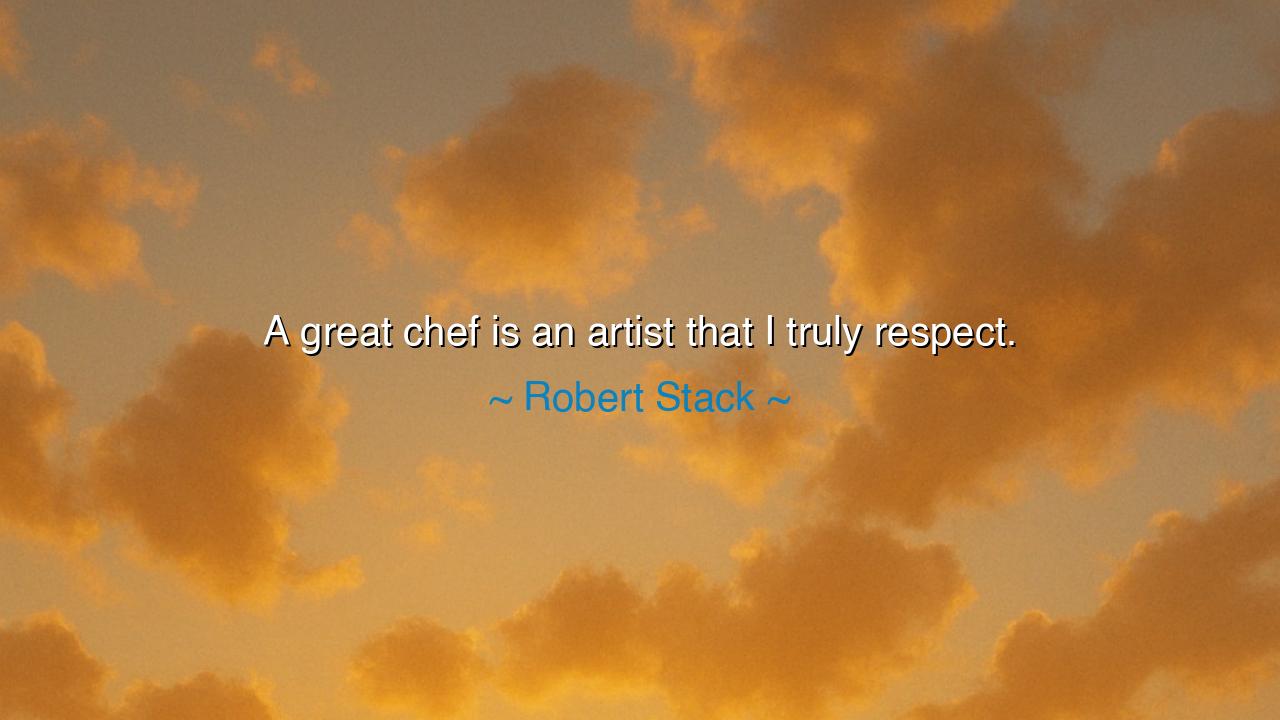
A great chef is an artist that I truly respect.






Hear, O lovers of craft and connoisseurs of creation, the words of Robert Stack, who said: “A great chef is an artist that I truly respect.” At first, this may seem but a simple praise of cooking, yet in truth, it carries the weight of an ancient truth—the union between art and sustenance, between creation and care. For in the hands of a true chef lies not merely the skill to feed the body, but the power to move the spirit. The kitchen, like the sculptor’s studio or the painter’s hall, is a temple where the raw elements of the earth are transformed into beauty, and through that beauty, into love.
When Stack calls the chef an artist, he speaks of mastery born not from luxury but from devotion. The great chef, like the poet or the painter, labors daily against the limitations of matter and time. He takes what is humble—grain, fruit, meat, and fire—and through vision and discipline, gives it new form. This act of creation, though fleeting, is no less sacred than the carving of marble or the writing of verse. For though a meal vanishes when eaten, the experience it creates endures, lingering in memory, in joy, in the warmth shared between souls.
The ancients knew this truth well. In Greece, the banquet was not merely an occasion of appetite, but of philosophy, conversation, and communion. The host was an artist of harmony, balancing flavor with music, nourishment with meaning. In China, the imperial chefs of the Tang and Ming dynasties were revered not as servants, but as scholars of flavor, men who understood that the palate could teach serenity just as the brush could teach grace. And in the medieval courts of Europe, the cook was as vital to culture as the minstrel—for both fed the heart, one through melody, the other through taste.
Let us recall the story of Auguste Escoffier, the legendary French chef who revolutionized modern cuisine. Before him, kitchens were chaotic, governed by ego rather than elegance. But Escoffier, through vision and order, transformed cookery into a disciplined art. He introduced structure, respect, and refinement—elevating the chef from laborer to artist, from servant to creator. His dishes, though perishable, carried a philosophy: that beauty need not last forever to be eternal. For art’s true immortality is not in its form, but in its effect on the soul.
To respect the chef, as Stack does, is to recognize this union of artistry and humility. The painter signs his work and sees it endure through centuries; the chef watches his vanish in moments, yet continues to create. There is wisdom in such transience. It teaches that greatness is not measured by permanence, but by presence—by the ability to bring joy, however brief, to those around us. The artist feeds the imagination; the chef feeds both imagination and life itself.
Stack’s reverence also reminds us that creativity takes many forms, and that no craft is too humble to contain divine expression. Whether one cooks, builds, writes, or teaches, what matters is not the medium, but the spirit of artistry within the work. The true artist, like the true chef, pours a part of his soul into what he creates, and through that act, touches eternity in the hearts of others.
Let this be the lesson for all who labor with their hands and hearts: treat your work as art, and it will become art. Approach your craft—whatever it may be—with care, patience, and imagination. Do not seek glory, but depth; do not chase applause, but connection. For every act done with love becomes a masterpiece in the eyes of time.
Thus, the words of Robert Stack echo across ages: that the great chef, and indeed every great creator, is an artist not because of fame or form, but because of spirit. Respect, then, those who transform the simple into the sublime. For in their quiet art, they remind us of the eternal truth—that to create with love is to honor life itself.






AAdministratorAdministrator
Welcome, honored guests. Please leave a comment, we will respond soon